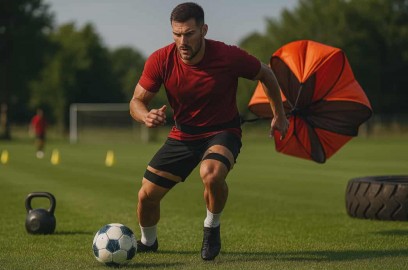
The road to professional football requires not only technical skills but also proper physical preparation. A player who wants to reach the professional level must combine strength, explosiveness, speed, and endurance to withstand the intensity of matches and training in professional clubs.
Below you will find a plan and key guidelines on how to develop these three pillars of physical preparation.
-
STRENGTH – FOUNDATION OF STABILITY AND INJURY PREVENTION
A strong body is the basis for 1v1 duels, winning positions, or maintaining balance at high speed. Building strength does not mean bodybuilding – it is about functional power that translates onto the pitch.
-
Key exercises: squats, deadlifts, lunges, push-ups, pull-ups, bodyweight training.
-
Training: 2–3 times per week, focusing on correct technique and progressive overload.
-
SPEED – THE CRUCIAL DIFFERENCE BETWEEN AMATEUR AND PROFESSIONAL
A professional footballer must be fast not only over 30–40 meters but also in the first 5–10 meters. Explosiveness and acceleration are what give the edge in duels.
-
Exercises: short sprints (5–20 m), sprints with changes of direction, resisted runs (bands, parachutes), plyometrics (jumps, box jumps, skipping).
-
Rule: speed training should be done when fresh – ideally at the start of a session.
-
ENDURANCE – READINESS TO PLAY AT FULL TEMPO
At the amateur level, players often slow down in the second half. Professionals must maintain high intensity for the full 90 minutes.
-
Interval training: 15–30 second sprints with short rests (HIIT).
-
Small-sided games: e.g. 3v3 or 4v4 in tight spaces – simulating match effort.
-
Continuous running: 1–2 times a week to build aerobic base (20–30 minutes at easy pace).
-
COMBINATION OF ELEMENTS – HOW PROFESSIONALS TRAIN
Professional players do not completely separate technical and physical work. The best results come from combining both:
-
Sprints with and without the ball.
-
Strength drills combined with football actions (e.g. jump + header).
-
Games under fatigue, forcing decision-making under intense effort.
-
RECOVERY AND DIET – THE FOURTH PILLAR OF DEVELOPMENT
Strength, speed, and endurance develop only when the body has time to rebuild. That’s why:
-
Sleep at least 8 hours.
-
Adequate intake of protein, carbs, and healthy fats.
-
Stretching, foam rolling, recovery methods (cold baths, sauna).
SUMMARY
For a player to progress from amateur to professional level, the body must be prepared to handle intensity and repeatability of effort. Strength provides stability and injury prevention, speed offers an edge in duels, and endurance allows maintaining performance throughout the entire match.
Only a complete approach – technique + physical preparation + recovery – will ensure a player is ready to enter the world of professional football.





